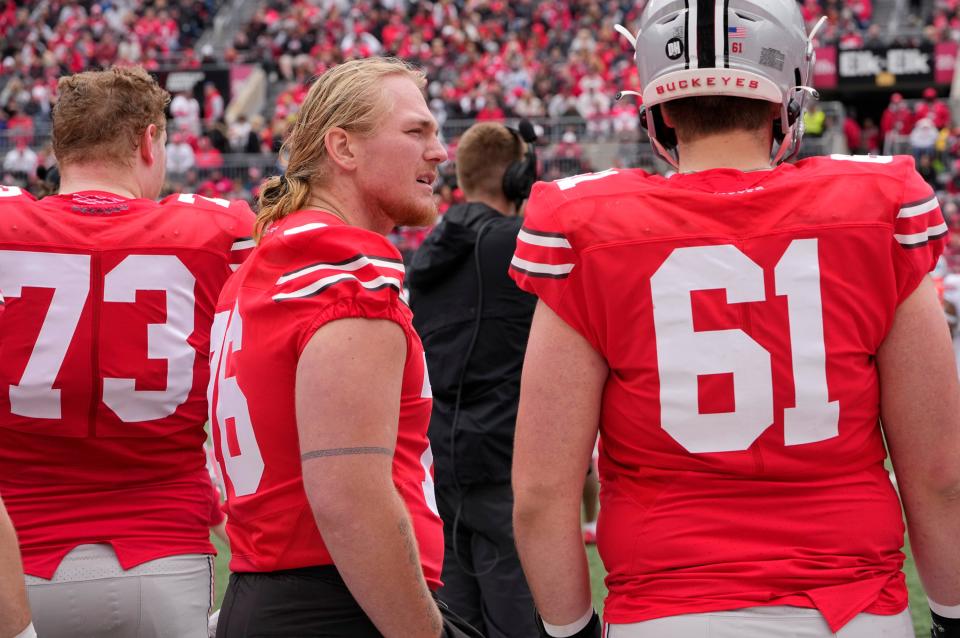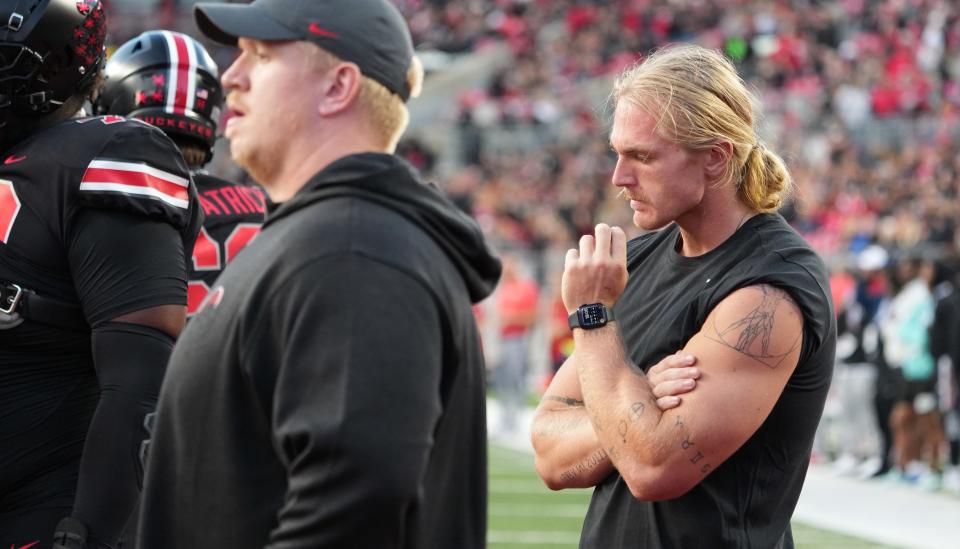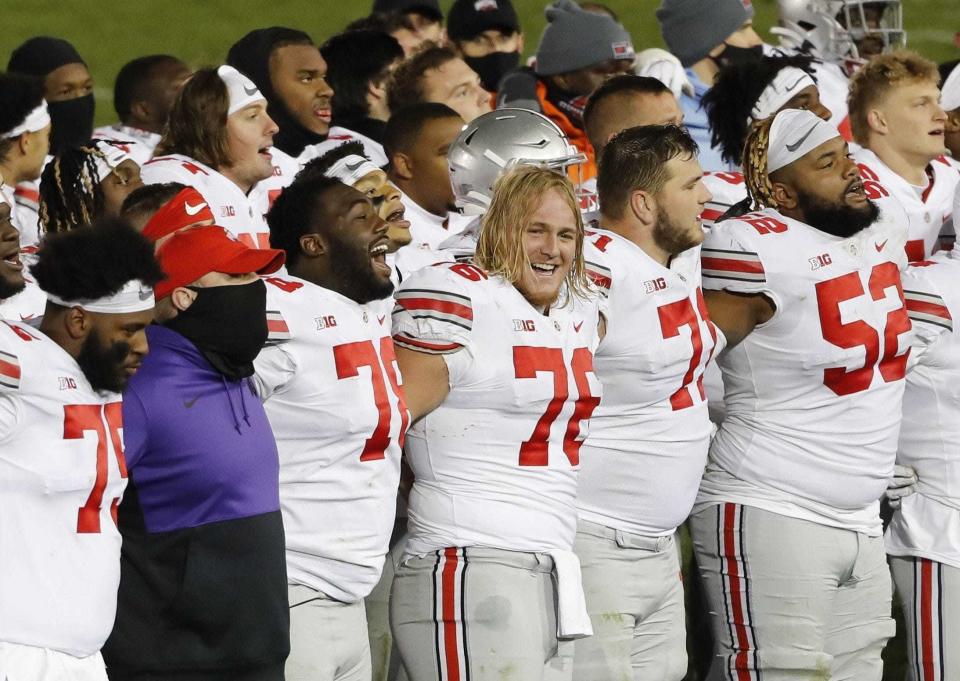What's next for Ohio State football's Harry Miller after he graduates?

Harry Miller was at Ohio State on Wednesday to pick up part of his graduation regalia.
His time at the university winds down this week.
“It is one of those things where it feels like it’s never going to end,” Miller said, “like it’s going to be a perpetual state of scheduling the next semester. Now it’s like, ‘Here you go.’ It’s very cool.”
Miller took take part in an autumn commencement at the Schottenstein Center on Sunday, receiving a degree in mechanical engineering.
The ceremony capped 4½ years, a period that began in 2019 when Miller arrived in Columbus as a decorated offensive line recruit from suburban Atlanta.
He ascended the depth chart after a year with the Buckeyes, starting at left guard as a sophomore before medically retiring in 2022 due to mental health challenges that included contemplating suicide.

“I started out as just a second grader playing football with my friends,” Miller said, “and then I became somebody who had to manage all of these things that I never really signed up for but eventually became a part of what I was expected to bear. For me, I found it intolerable.”
Following graduation, the 22-year-old is pursuing a variety of creative outlets. His projects include writing a book. He has already signed with a literary agent. He is making movies as part of a production company he founded with longtime friends known as Mint Factory Productions. Their short film, “18 to Water Street,” is in post-production.
Miller is captivated by the prospect of storytelling.
“Perhaps I have too much of an imagination,” he said, “and perhaps I read too much as a kid.”
He cited novels such as “The Count of Monte Cristo, “Moby-Dick” and “The Three Musketeers” as literature that inspired him at an early age.
“Storytelling is the oldest human tradition,” he said, “much older than building bridges like an engineer.”
That is the career path he has charted instead of one in engineering, even as he graduates summa cum laude with that as his major.
“I revere engineering,” Miller said. “I revere the math and science. But I don’t think I can contribute anything new to the field of engineering. Perhaps I can, and I just don’t have the belief in myself. I think I could do a sufficient job, but nothing special.
“Whereas creatively, I feel like I can dig things out of myself and contribute new things, in which case it I feel like I’m supposed to do that. I feel like I can contribute the most.”

Miller will remain an advocate for mental health. Since he began publicly sharing his experiences with depression and anxiety almost two years ago, he has been contacted by many college athletes dealing with high expectations and trying to balance obligations in the classroom and in their sports during a formative period in their lives. He said he hears from someone about once a week.
An NCAA survey of athletes published this week found 17% of male athletes and 44% of female athletes feel overwhelmed.
“Student-athletes are a very important population,” Miller said. “It’s a group that has a huge load to bear. And they might be – I know I was − avoidant of receiving help.”
He addresses wider audiences as well. He gave a TED Talk at Ohio State in March, among other public speaking engagements, and works with SonderMind, a mental healthcare company.
More: Harry Miller: 'Don’t make it weird.' Asking for help 'strongest and wisest things to do'
Next year, he is considering reapplying for a Rhodes scholarship. A return to academia would involve studying much-needed public policy solutions to address mental health. U.S. Surgeon General Vivek Murthy referred to youth mental health as "the defining challenge of our country" when he met with The Dispatch last year.
“I think about Big Tech and its effects on mental health, especially younger users,” Miller said. “There’s a lot of policy that can be done to mitigate those issues.”
Challenges persist for Miller. He continues to deal with feelings of depression, though he has discovered more ways to manage them over the past few years.
He said he found a “fatal flaw” was limiting his communication with family and friends when he got down, a habit that resulted in isolation. To combat it, he makes sure he’s in touch with them when he’s low.
“It’s things like that,” Miller said. “There are fixes for everybody.”
Others involve hobbies. He goes on frequent walks and runs about 25 miles a week, exercise that has allowed him to slim down as a result. When he was an offensive lineman, he weighed about 320 pounds. He’s now 240 pounds.
Miller tries to channel his creative side too from playing his guitar to writing poetry or songs.
“I don’t let a feeling go to waste,” Miller said. “Even if it’s something like sadness. It lends toward beautiful creativity. What is so hard about being a former student-athlete or an engineer or a high-achieving person is that when you are sad, you feel like you're wasting time and you're doing nothing.
“But maybe it's a trick for myself where I feel like, if I'm creating something, then this sadness is worth it and it'll pass and when I when I come out of it, I'm going to have a souvenir. So let’s do it. That works for me.”
That is the course for Miller as he shares with others.
“I hope and I have faith,” he said. “Hope is pretending to believe in something until one day you don't have to pretend anymore. And it’s devotion to the rituals, and for me in this case, the ritual is living.”
How to seek help
If you or someone you know is struggling or in crisis, help is available. To get in touch with a trained listener call or text 988 or chat at 988lifeline.org.
You can also text HELLO to 741741 for emotional crisis support. It is free, available 24/7, and confidential.
Joey Kaufman covers Ohio State football for The Columbus Dispatch and can be reached at jkaufman@dispatch.com.
Get more Ohio State football news by listening to our podcasts
This article originally appeared on The Columbus Dispatch: OSU's Harry Miller, mental health advocate, reflects on graduation

